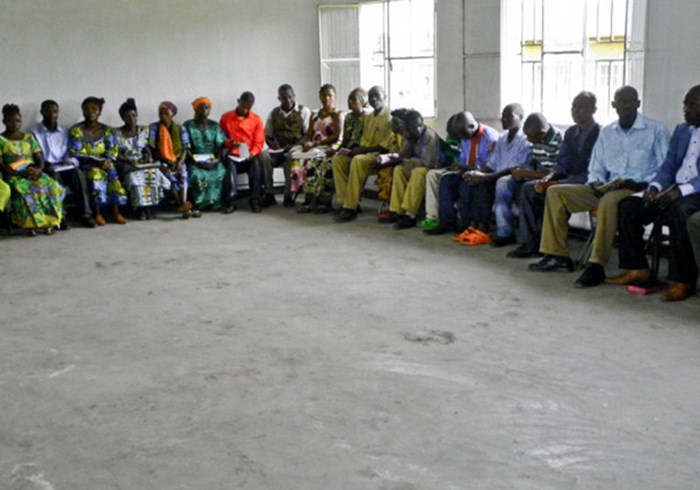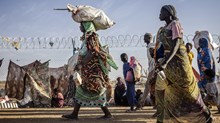
Violence erupted again this week in the fractured Democratic Republic of the Congo (DRC) when at least 20 people were killed in clashes between the government and the M23 rebel militia, breaking a truce that had held since last November.
The fighting paused Thursday (May 23) for the arrival of United Nations Secretary-General Ban Ki-moon in the city of Goma in eastern Congo, according to the BBC. Meanwhile, the United Nations' new 3,000-person intervention brigade has also begun to arrive in Goma. The force will be allowed to offensively target and "neutralize" violent groups in the region, an unprecedented step for the UN.
Amid the clamor and negotiations, it would be easy to overlook one new movement, working to heal eastern Congo: Small groups of Congolese church leaders, including influential local women, are volunteering to solve and prevent conflicts one at a time, without fanfare.
It's a simple idea. But in a nation where political solutions are often given more attention than community solutions, World Relief, the humanitarian arm of the National Association of Evangelicals, believes these committees, which require the inclusion of female leaders, could be a key to peace.
For the last several years, World Relief has been forming "village peace committees" in eastern Congo. World Relief has had an office in the city of Goma since 2001, and they began the committees as a pilot program intended to foster peace at the grassroots level.
"We've wrapped everything together under the theme of peace," said World Relief President Stephen Bauman. "We're still doing microfinance, we're still doing food security, we're still doing health, but we now have 22 peace committees. We're piloting a peace-building initiative through local churches and recognizing that unless the tribes come together, unless churches come together, all these other activities can sometimes be jeopardized."
The committees try to keep conflicts like family disputes, domestic conflicts and crimes from escalating into large-scale divisions that have boiled for years along tribal and ethnic lines.
"It's a failed state, to be honest — and a lot of systems, the judicial system being one of them, are not what they really should be," said Rhona Murungi, program manager of World Relief's East and Central Africa programs. "You could say that for a lot of African countries, but Congo is an extreme in this case."
Murungi said World Relief came up with the idea for the program after hearing from Congolese people for years that they could fully benefit from World Relief's full range of programs "if only we had peace."
"When we train and empower the people in authority, first of all to accept each other and sit at the same table as someone from another tribe that you've hated for forever — they in turn help to stop would-be conflicts," Murungi said.
Séverine Autesserre, an expert on Congo peace-building who teaches at Barnard College and Columbia University, said she had not heard of World Relief's initiative, but she had noticed that large-scale peace efforts in Congo often overshadowed the need for peace-building on the village level.
"Nationally- and internationally-focused conflict resolution overlooks important local dynamics that threaten order — or prevent its implementation in the first place," Autesserre wrote in an article for the journal Review of African Political Economy.
Paul Robinson, president of Congo Initiative-USA and professor emeritus of Wheaton College (Illinois), said though he could not comment specifically on the peace committee model, he admired World Relief's commitment to working through local Christians for peace-building efforts.
"The church is the best hope for any transformational initiative, because it transcends all of the boundaries in which other organizations tend to get caught," Robinson said.
In another article looking at the bigger picture of East Africa, Autesserre writing in Foreign Affairs said, "Until the local grievances that are feeding the violence throughout eastern Congo are addressed, security in the entire country and the Great Lakes region overall will remain uncertain."
Open wounds
The Democratic Republic of the Congo has been beset by violence for decades. The civil war there, which formally ended in 2003, left at least three million people dead. Some experts have called it one of the world's deadliest conflicts since World War II, and its repercussions are far from over.
"A 16-year-old kid in Congo has never known extended periods of peace in their life. It is just the way it is in eastern Congo," Murungi said.
World Relief's program has been tested against a background of negotiations, militia takeovers, and failed peace negotiations on the political and regional stage. Last November, for example, many of World Relief's development programs in the country were put on hold when the M23 militia took control of Goma, where World Relief's operations were based. Much of the organization's staff will evacuate across the border to Rwanda at such times.
But since the village peace committees are run by local Congolese leaders, the takeover last November did not stop the groups from meeting to resolve conflicts in their communities — and the militia even began to bring their own disputes to the committees.
"This was just another blip on the screen for [the committees]," said Charles Franzén, country director for World Relief's work in the Democratic Republic of Congo. "They're just seen as people that can be trusted and respected, don't take money for what they do and are conflict resolution experts, and so everybody needs them."
M23 officially ceded control of Goma after just 10 days of occupation, and peace talks between the government and the rebels began in Kampala, Uganda on Dec. 9. Those negotiations had stalled before the resumption of violence this week.
Franzén said he saw that no matter who had control of the region, or no matter what happened between the government and the militias, "the need for peace builders and peace agents has never been greater."
The majority of Congo identifies as Christian, so working through local church leaders is a viable strategy, though Muslim leaders and other leaders also serve on the committees.
"Most of them are very strongly evangelical Christian committees," Franzén said. "I think the church is a very powerful unit as a whole in Congo, and to have the church involved in something as essential as building bridges to peace and solving and resolving conflicts is something that is a witness. But it's more than that — I think it really proves to the government and to the UN and everybody else how important the church is."
Each village committee has to include a cross-section of that village's tribes as well as religious and denominational diversity. They also must include at least three women, which is especially important given the prevalence of violence against women in Congo, where rape is used as a weapon of war.
"When a mother has a child from a rape, that child belongs to the tribe of the enemy, of the man that raped her," said Murungi, the World Relief program manager. "So that creates a lot of dissension or conflict within the tribe."
Then, Murungi said, the mother is often cast out from her community. She said World Relief was planning to use the village peace committee model to draw more attention to the plight of women in Congo and work to prevent sexual abuse.
Peace Takes Time
Marcel Serubungo, a Congolese pastor who leads church engagement for World Relief in Congo, shared a story of one domestic conflict where a committee intervened in a village near the city of Goma.
Serubungo said that a husband and wife had been arguing for many days until their neighbors called for the peace committee to step in. During conflict mediation, the committee learned that both the husband and wife had separately bought poison to kill themselves. After talking with the committee, Serubungo said, they resolved to live in peace.
"As the peace committees are composed [of] respected, equipped and trained people in the villages, they are considered as parents instead of judges," Serubungo wrote in an e-mail interview. "People do no longer reach out to the police or other government structures, except for sensitive cases, such as rape [and] murder."
This kind of conflict resolution does not require billions of dollars, like the United Nations' intervention force. Nor does it attract media attention like peace summits between political leaders. What it does require, according to Franzén, is a long-term commitment to the community.
"Nobody else is willing to do this kind of grassroots conflict resolution because it's time-consuming. It requires a tremendous amount of energy," Franzén said. There are other non-governmental organizations who work for peace, but Franzén said they did not have a reach as wide as World Relief's network of churches.
Future plans
World Relief is ready to expand its peace committee program across the region, with a goal of 1,000 committees in the five provinces of eastern Congo. That would mean 10,000 people trained to serve on the committee using conflict resolution techniques.
The challenge, Franzén said, is funding. Forming the 1,000 committees would cost at least $2 million. Franzén speaks to churches in the United States about the conflict, trying to convince American Christians to support a non-military solution.
Lynne Hybels, author and wife of Willow Creek's Bill Hybels, has traveled to Congo with Belinda Bauman to support World Relief's work. She believes peace is possible in the country because she has seen change firsthand and because the organization seeks long-term solutions through local people.
"No matter what happens on a political, international level, there has to be this foundation of peacemaking on the ground," Hybels said. "I'm not saying this can be solved overnight, but if we believe in the Kingdom of God, how can we not do whatever we can to see the Kingdom of God unfold, even in a place as desperate as the Congo?"

Support Our Work
Subscribe to CT for less than $4.25/month


















